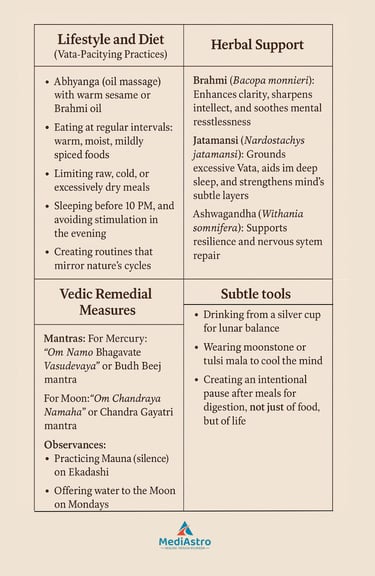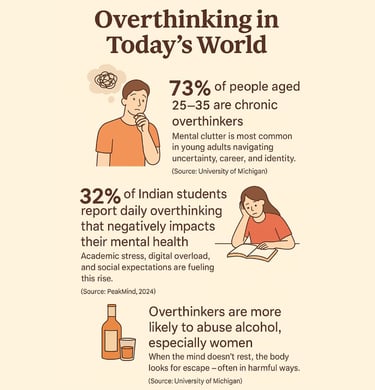Ayurvedic & Astrological ways to control Excessive Overthinking
Overthinking is problem rising everyday in today's fast paced and stressed world. Learn about how excessive overthinking causes more than just mental health problems along with ayurvedic and astrological ways to overcome it.
The Silent Impact of Overthinking
Overthinking has become a silent epidemic in today’s hyper-connected world. While it may seem like just a mental habit, ancient sciences like Ayurveda and Vedic astrology reveal a much deeper story. Chronic overthinking doesn’t just affect your peace of mind, it quietly disrupts your digestion, sleep, hormones, and even your energy field (aura).
In this blog, we explore:
The Un-noticed problem of overthinking
Overthinking in ayurveda
Physical signs of excessive overthinking
Overthinking in Vedic Astrology
Ayurvedic and astrological remedies
I. The un-noticed problem of Overthinking
In the quiet hours of the night, when the body rests but the mind refuses to yield, a common adversary reveals itself overthinking. It is not loud, nor overtly destructive, yet it weaves a web of mental entanglement that stretches far beyond the realm of the intellect. To the modern eye, overthinking appears as a mere mental glitch, an unwanted but tolerable side-effect of ambition, anxiety, or uncertainty. However, ancient sciences offer a far more layered interpretation.
In today’s hyper-connected world, overthinking affects nearly 73% of adults aged 25–45, according to research published in Psychology Today. With constant exposure to digital media, the brain processes up to 74 GB of information daily which is the equivalent of watching 16 movies, leading to mental fatigue, anxiety, and sleep disruption. Studies also show that chronic overthinkers are 2.5 times more likely to suffer from digestive issues and insomnia. Despite being normalized, overthinking is silently becoming one of the most damaging lifestyle epidemics of our time.
II. Overthinking in Ayurveda
In Ayurvedic thought, the mind (manas) is part of a dynamic system governed by the three doshas—Vata, Pitta, and Kapha. Of these, Vata dosha, composed of air and ether, is most intimately connected to mental activity. It governs movement: of breath, of neurons, and most crucially, of thought.
Overthinking is a classic symptom of Vata aggravation, a condition where the natural flow of mental energy becomes erratic, dry, and excessive. The subdosha Prana Vata, which resides in the head and governs mental clarity, becomes disturbed. The result is a loop of persistent thoughts, worries, hypotheticals; an internal chatter that cannot be quelled.
The effects, however, do not remain confined to the mental field. When Vata destabilizes, it weakens Agni (the digestive fire). Meals are no longer digested properly, leading to bloating, irregular hunger, or even constipation.
Over time, weakened Agni compromises Ojas, the body’s vital essence. Ojas, considered the substratum of immunity and vitality, begins to erode under the weight of chronic mental unrest. What appears as “just thinking too much” may, in fact, be quietly draining the very fuel of life.
III. Physical signs of excessive overthinking
The body is not a passive observer of mental imbalance, it is a canvas upon which the turbulence of thought paints its consequences. Overthinking leaves its imprint on various physiological functions, often in ways that are mistaken for unrelated ailments.
Digestive Disturbances: The gut is among the first systems to reflect mental instability. When Prana Vata becomes disordered, it disrupts Samana Vata (responsible for digestion and nutrient assimilation), resulting in bloating, dryness, gas, and alternating appetite. Ayurveda refers to this as the loss of synchronous movement between mind and gut.
Sleep Disruption: Chronic worry often leads to insomnia, interrupted sleep, or a feeling of waking unrested. This is due to Vata’s dominance during the night hours, which, when aggravated, prevents the mind from transitioning into rest. Even dreams become vivid, fragmented, or agitating.
Hormonal and Endocrine Effects: Persistent mental tension elevates cortisol and disrupts the balance of hormones like melatonin and serotonin. For women, this may show up as menstrual irregularities or exacerbated PMS. For all, it signals an overdriven sympathetic nervous system.
Skin and Immunity: Ojas depletion can manifest through dull skin, dryness, increased sensitivity, and a subtle lack of luster. The body’s resistance lowers. One becomes prone to frequent colds, fatigue, or a general sense of fragility (in short the immune gets weakened).
In sum, the body does not lie. It faithfully echoes the unrest of the mind, sometimes softly, other times through unmistakable breakdown.
IV. Overthinking in Vedic Astrology
Beyond the physical lies the subtle body — a network of nadis (energy channels), chakras (energy centers), and the aura. In Ayurveda, the subtle body is nourished by Tejas (mental clarity) and Ojas (vitality). Excessive thought, especially rooted in fear or doubt, generates heat and depletion in this layer.
The aura becomes dense, scattered, or even porous. Individuals may report hypersensitivity to sound, difficulty focusing, or feeling easily drained in crowds. These are signs that one’s energetic boundaries have been compromised by mental overexertion.
Vedic astrology sheds further light on this dynamic:
Mercury (Budha): The karaka (significator) of intellect and communication. When Mercury is afflicted by Saturn, Rahu, or combust by the Sun and it can result in restlessness, excessive analysis, and mental looping.
Moon (Chandra): The Moon governs the mind’s emotional stability. A weak or afflicted Moon leads to indecisiveness, emotional overwhelm, and poor sleep.
6th, 8th House Afflictions: Planets in these dusthana houses, particularly the Moon or Mercury, can indicate karmic patterns of obsessive thought, anxiety, or inherited nervous tendencies.
These planetary alignments are not deterministic, but they reveal predispositions, seeds of thought patterns waiting for the right soil to sprout. Awareness of them allows for meaningful remediation.
V. Ayurvedic and Vedic Protocols for the Restless Mind
The path toward stillness is not paved with suppression, but with alignment. Ayurveda offers profound tools to restore harmony to the mind-body system, starting with rhythm and nourishment.
To overthink is to fragment one’s presence across a thousand imagined scenarios. It robs the breath of its depth, the heart of its steadiness, and the body of its rest. Yet within this habitual unrest lies an opportunity to return.
Both Ayurveda and Vedic astrology invite us not merely to escape thought, but to refine it. To align with rhythms older than anxiety. To honor the mind as sacred, but not supreme. The solution is not in fighting thought, but in cultivating stillness, a stillness that nourishes, centers, and awakens.
In the end, silence is not the absence of thought. It is the return to a deeper intelligence; the one that exists beyond the noise.
Hope you find this article good, please let us know your thoughts by leaving us a review !




